- Experts
- Securing Ukraine
- Topics
-
Regions
FeaturedIntroduction Throughout its decades of independence, Myanmar has struggled with military rule, civil war, poor governance, and widespread poverty. A military coup in February 2021 dashed hopes for…
by Lindsay Maizland January 31, 2022
-
Explainers
FeaturedDuring the 2020 presidential campaign, Joe Biden promised that his administration would make a “historic effort” to reduce long-running racial inequities in health. Tobacco use—the leading cause of p…
by Olivia Angelino, Thomas J. Bollyky, Elle Ruggiero and Isabella Turilli February 1, 2023 Global Health Program
-
Research & Analysis
FeaturedExecutive Summary In the decades following World War II, the United States was the undisputed leader of the global economic system. It had the strongest economy in the world and championed a set o…
Report by Matthew P. Goodman and Allison J. Smith March 25, 2025 RealEcon
-
Communities
Featured
Webinar with Carolyn Kissane and Irina A. Faskianos April 12, 2023
-
Events
FeaturedRichmond Fed President Tom Barkin discusses U.S. monetary policy and the outlook for inflation and labor markets. The C. Peter McColough Series on International Economics brings the world’s foremo…
Virtual Event with Tom Barkin and John Lipsky April 1, 2025
- Related Sites
- More
Ukraine’s Struggle for Independence in Russia’s Shadow
Ukraine has shown resilience and perseverance despite facing multiple challenges—most notably Russian interference—since it achieved independence in 1991. Russia’s threats have culminated in the annexation of Crimea and Europe’s biggest land battle in eighty years.



Ukraine Votes for Independence
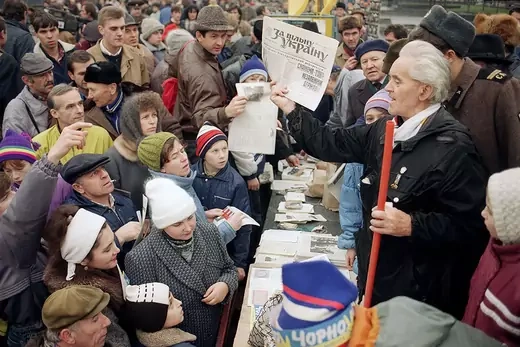
Amid the dissolution of the Soviet Union, Ukraine votes for independence in a referendum, with 92 percent of Ukrainians supporting independence, and elects Leonid Kravchuk as president. Ukraine had the second-largest population and economy of the fifteen Soviet republics.
Securing Nuclear Warheads
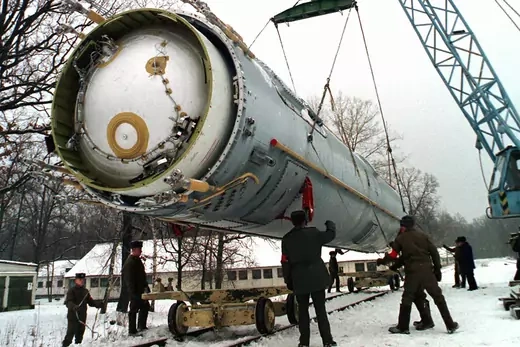
The Russian, Ukrainian, and U.S. presidents sign a statement that reaffirms Ukraine’s commitment to transfer all strategic nuclear warheads to Russia and dismantle strategic launchers in its territory. The statement also confirms Russian readiness to compensate Ukraine for the value of the highly enriched uranium in the warheads, notes U.S. readiness to assist Ukraine in dismantling the launchers, and specifies security assurances Ukraine will receive once it accedes to the Nuclear Nonproliferation Treaty (NPT) as a non–nuclear weapons state.
Ukraine Joins NATO’s Partnership for Peace
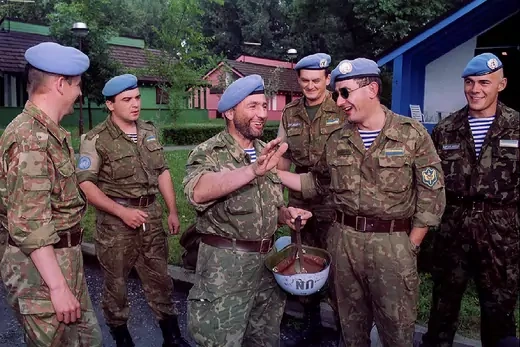
The North Atlantic Treaty Organization (NATO) welcomes Ukraine into its Partnership for Peace, a collaborative arrangement open to all non-NATO European countries and post-Soviet states. Ukraine and Hungary become the fifth and sixth members of the partnership. Russia becomes a member that June and conducts various cooperative activities with NATO, including joint military exercises, until 2014, when NATO formally suspends ties. As the Cold War ended, Russia had opposed the eastern expansion of NATO. However, thirteen former partnership members eventually join the alliance.
Kuchma Becomes President
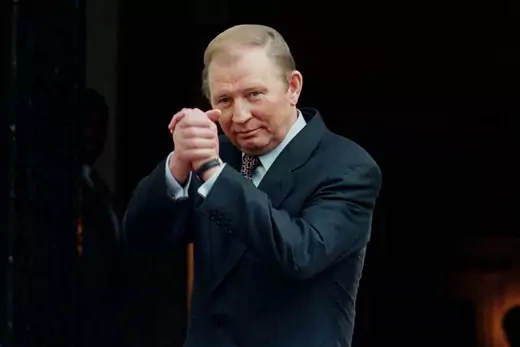
Former Prime Minister Leonid Kuchma defeats incumbent President Leonid Kravchuk. It is the first time an incumbent has been defeated in a presidential election in a former Soviet republic. Kuchma’s presidency is marked by slow growth, several economic crises, and charges of rampant corruption.
Budapest Memorandum Signed
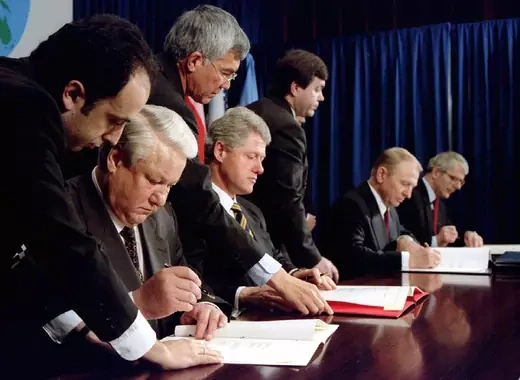
The Budapest Memorandum on Security Assurances [PDF] is signed by Russia, Ukraine, the United Kingdom (UK), and the United States, following Ukraine’s accession to the NPT as a non–nuclear weapons state. Russia, the UK, and the United States commit to respecting Ukraine’s sovereignty, territorial integrity, and independence, and promise to not threaten or use force against Ukraine.
New Constitution Ratified
The Ukrainian parliament ratifies a new constitution [DOC]. It theoretically requires separation of powers, but the president holds significant sway. He or she can dismiss the prime minister and rescind acts of the cabinet, for instance. Among other things, the constitution guarantees free speech and private-property ownership and recognizes Ukrainian as the sole state language.
NATO, Ukraine Deepen Partnership
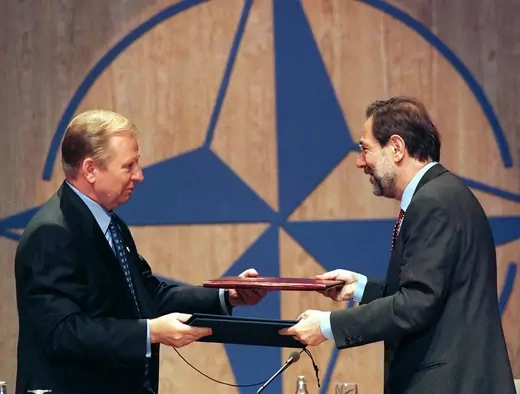
Kuchma meets with NATO leaders in Madrid, where they sign a document establishing a distinctive partnership between Ukraine and the defense alliance. Under this partnership, a NATO-Ukraine commission will meet at least twice per year to discuss the relationship.
Gongadze Scandal Prompts Protests
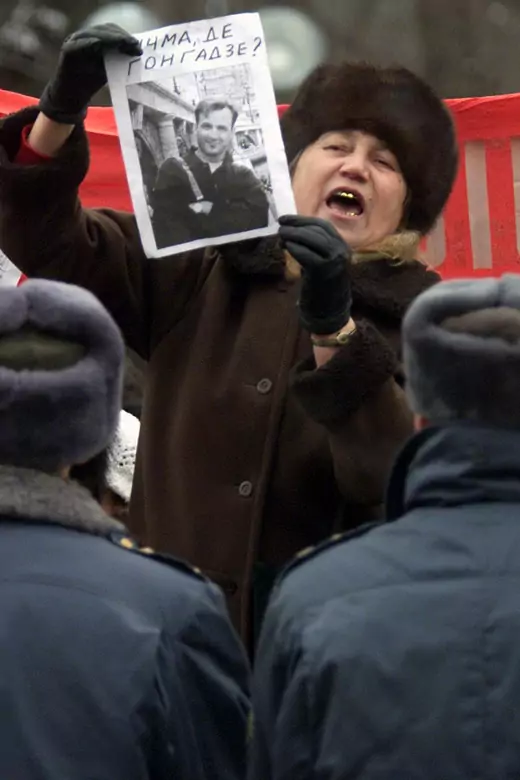
On September 16, Heorhiy Gongadze, a Ukrainian journalist investigating alleged corruption in the Kuchma administration, disappears. His beheaded body is found two months later in a forest outside of Kyiv. Audio recordings eventually surface that purport to show Kuchma ordering subordinates to kill Gongadze. The scandal spurs public discontent about corruption among Ukraine’s elites, leading to street protests. Western countries reconsider their support of Kuchma’s government.
Prime Minister Yushchenko Ousted Amid Reform Moves
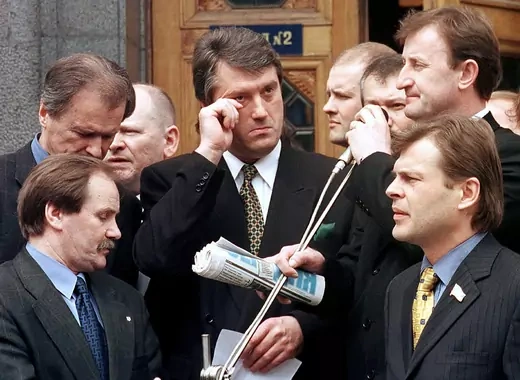
The parliament passes a no-confidence motion against Prime Minister Viktor Yushchenko, who steps down. The vote is carried out by parties allied with Kuchma, who had surprised observers when he nominated Yushchenko to be prime minister in 1999. Yushchenko and his deputy Yulia Tymoshenko had been pushing through energy sector reforms that became unpopular with many of Kuchma’s oligarch supporters.
Orange Revolution Overturns Flawed Election
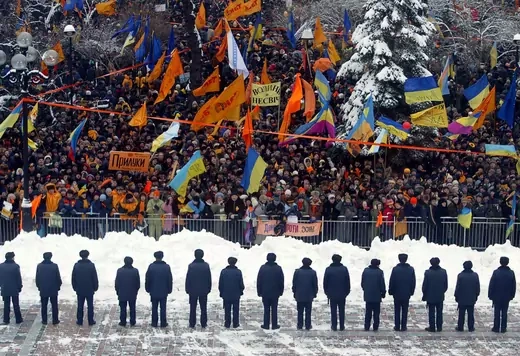
The 2004 presidential race pits Western-oriented Yushchenko against Viktor Yanukovych. Yanukovych is Kuchma’s preferred choice and the candidate supported by Moscow. The election is a tug-of-war between those who seek closer ties with the European Union (EU), NATO, and the West and those who favor closer alignment with Russia. Yushchenko mysteriously suffers dioxin poisoning in September; he survives but with his face disfigured. After two flawed rounds of voting award the election to Yanukovych, protesters dressed in orange, Yushchenko’s campaign color, take to the streets in large numbers and force a revote in December, which Yushchenko wins. The second so-called color revolution in a post-Soviet state—a year after Georgia’s Rose Revolution—sets off alarm bells in Moscow.
Russia Shuts Off Gas
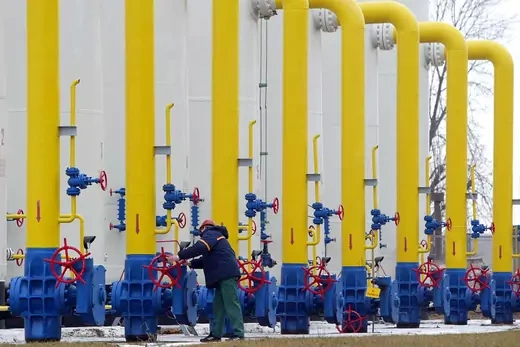
A pricing and transit dispute between the Yushchenko government and Russia’s state-owned Gazprom results in a gas cutoff, lasting a couple of days and quickly causing supply drops in European countries that import Russian gas via Ukraine. The dispute underscores the energy interdependence between Russia and Ukraine, with 80 percent of Russia’s gas exports to Europe passing through the country. At the same time, Ukraine relies on Russia for much of its own natural gas supply, for which it has historically paid below-market rates. The shutdown occurs amid an economic slowdown that begins to dent Yushchenko’s popularity.
NATO Expansion Bid Meets Opposition
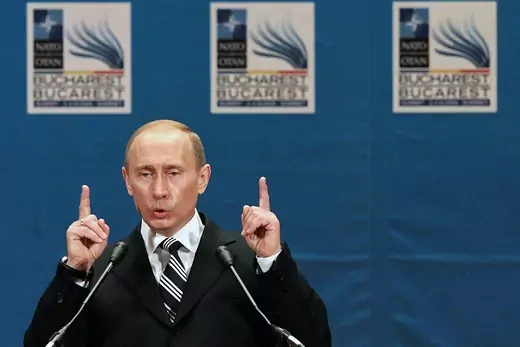
NATO begins its twenty-second summit amid a debate about whether it should offer Membership Action Plans (MAPs)—forerunners to membership—to Croatia, Georgia, and Ukraine. But in discussions between NATO officials and Russian President Vladimir Putin, Putin expresses opposition to extending MAPs to Georgia and Ukraine. Unable to reach a consensus, NATO members decline to offer a MAP to either. During a separate meeting, Putin reportedly tells U.S. President George W. Bush that Ukraine is “not even a real nation-state.”
Russia Invades Georgia
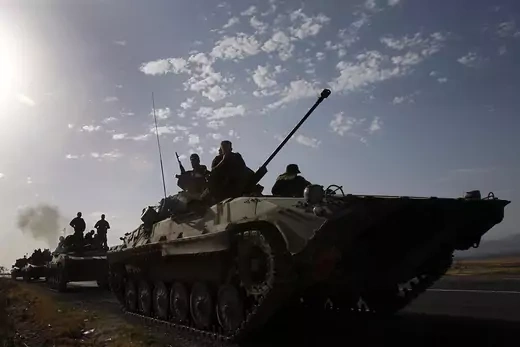
Russian troops invade Georgia following a Georgian military operation against a South Ossetian separatist stronghold. The invasion leads to a five-day war and results in an increased Russian presence in the breakaway Georgian republics of Abkhazia and South Ossetia, which represent roughly one-fifth of Georgian territory. Yushchenko sides with Georgia, further increasing tensions between Kyiv and Moscow. Russia subsequently recognizes both republics as independent states, though neither is recognized as an independent state by most countries.
Talks Open on New EU Relationship
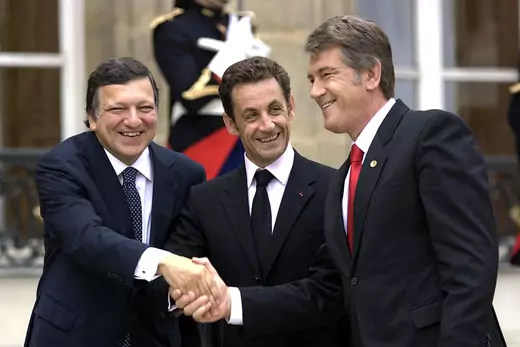
The EU and Ukraine begin talks on a new “association agreement” and issue a communiqué that “Ukraine’s future is in Europe.” The EU considers such agreements to be legally binding contracts that commit countries to developing closer political, legal, and trading ties with the EU and sometimes lead to accession to the bloc. Implementation of the association agreement could mean major changes in Ukraine that would bring it closer to EU standards.
Yanukovych Elected President
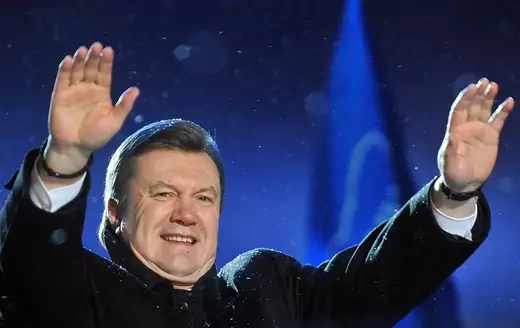
Yanukovych narrowly defeats Tymoshenko, prime minister at the time, in a presidential election that most international observers view as free and fair. Aided by political consultants from the United States, Yanukovych recasts himself as more open to EU integration. His victory is a sign of voter disillusionment with Tymoshenko and Yushchenko after several years of economic trouble.
Tymoshenko Sentenced, Brussels Freezes Agreement
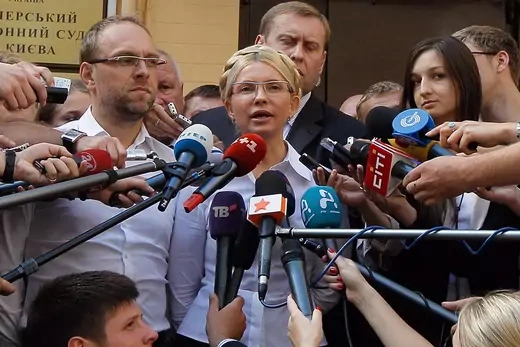
Yanukovych has Tymoshenko arrested for “abuse of office,” and she is sentenced to seven years in prison. International observers see the prosecution as a politically motivated way for Yanukovych to sideline his main opponent, and the U.S. ambassador calls the trial a farce, a view shared by many. The jailing stalls negotiations with the European Union over improving trade and political ties. Brussels refuses to finalize the association agreement at the December EU-Ukraine summit in Kyiv.
Yanukovych Withdraws From EU Talks
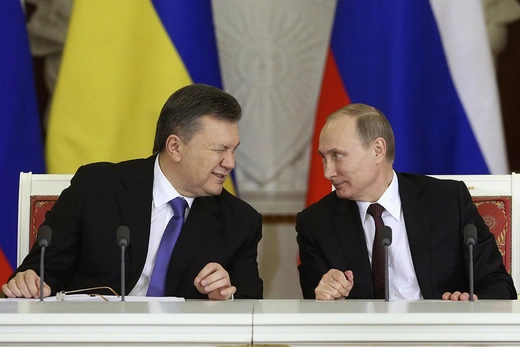
The Ukrainian government states that it will not sign the association agreement at an upcoming EU-Ukraine summit in Lithuania. Yanukovych’s administration announces it will resume dialogue with Russia about joining the Eurasian Customs Union. Protests begin in Kyiv almost immediately.
Euromaidan Protests Lead to Government Collapse
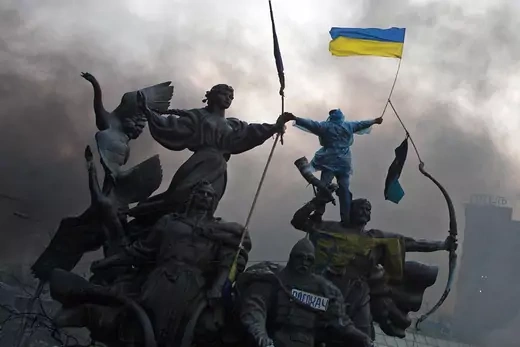
Ukrainians turn out in large numbers to protest Yanukovych’s announcement on EU ties. Mostly peaceful demonstrations continue for two months in Kyiv’s main Maidan square. They turn violent after the government moves to break up protesters, and the ensuing crackdown kills more than one hundred people. On February 21, Yanukovych and opposition leaders reach a settlement that includes plans for presidential elections before the end of the year. Soon after, Yanukovych flees to Russia. He leaves behind a lavishly decorated palace, which protesters see as evidence of his corruption. Ukraine’s acting president and acting prime minister make it clear that a top priority will be to bring Ukraine closer to Europe.
Russia Seizes Crimea, Holds Referendum
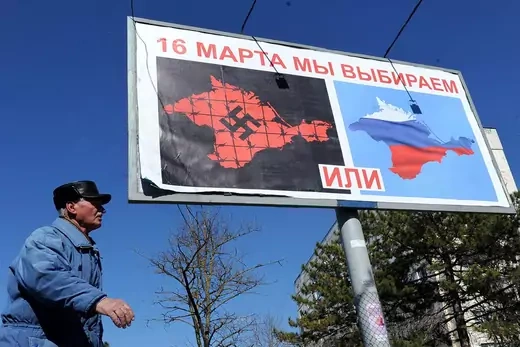
Pro-Russia forces, including so-called little green men—Russian soldiers in Russian uniforms, but with identifying insignia removed—seize control of Crimea, a Ukrainian peninsula where the majority of residents are ethnically Russian. Soon after, authorities hold a disputed referendum in which Crimean voters choose to secede and join Russia. Brussels calls the referendum “illegal and illegitimate,” and Washington promises it will never be accepted. Russia annexes Crimea on March 21, though the UN General Assembly votes 100–11 against recognizing the referendum result and Russia is expelled from the Group of Eight. A month later, Putin admits that Russian soldiers were involved in the annexation and justifies it as a way to protect ethnic Russians allegedly threatened by violence from Kyiv.
Russia Backs Bloody Separatist War
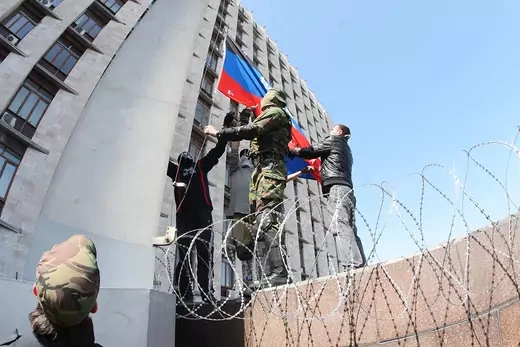
Russia provokes an armed separatist movement to seize government buildings across eastern Ukraine’s Donbas region. Ukrainian forces resist but are wary of sparking a much wider war, with Russian troop buildups reported along the border. By early 2022, fighting has resulted in more than fourteen thousand deaths, a quarter of them civilians, and two million internally displaced Ukrainians. Parts of two regions—Donetsk and Luhansk—declare themselves independent republics.
Poroshenko Elected President
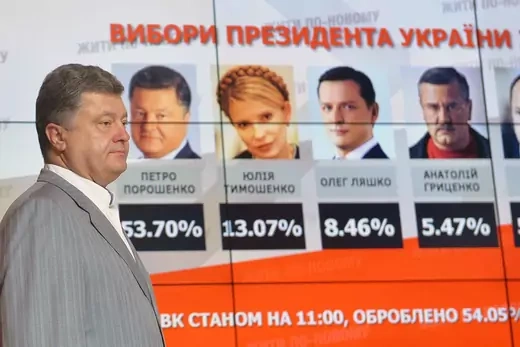
Petro Poroshenko, a pro-West oligarch, wins an outright majority in the first round of Ukraine’s presidential election, surprising many. Poroshenko promises to fix the economy by aligning Ukraine with Europe and to root out corruption that has trailed Ukraine since its independence. U.S. President Barack Obama’s administration signals interest in helping Poroshenko battle corruption and assigns Vice President Joe Biden as its chief envoy for Ukraine.
Passenger Jet Shot Down With Russian Missile
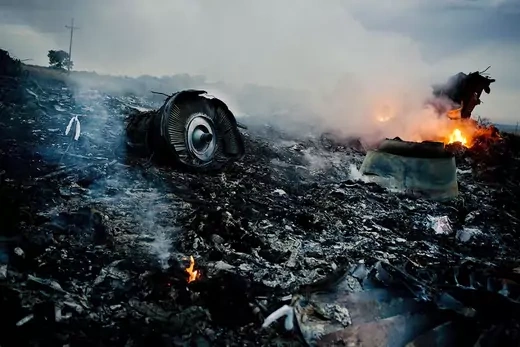
A Malaysia Airlines flight from Amsterdam to Kuala Lumpur is shot down by a surface-to-air missile over eastern Ukrainian territory controlled by Russian and Russian proxy forces, resulting in the death of all 298 people onboard. A Dutch-led investigation later finds that Russia bears responsibility, with the missile having been provided by a Russian army brigade, but Russia denies responsibility.
First Minsk Agreement Signed
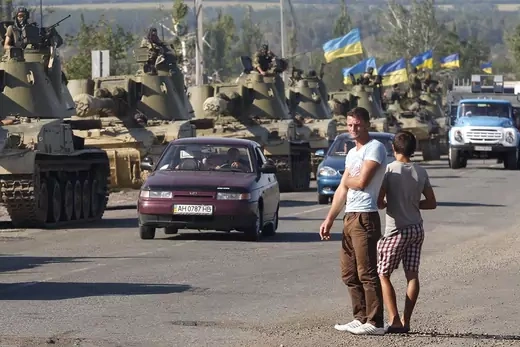
Russian units enter Ukraine to push back Ukrainian forces that were on the verge of regaining control of Donbas. Shortly after, negotiators conclude the first Minsk Agreement, aimed at ending the fighting. However, its terms are not implemented, and fighting continues along the line of contact.
Second Minsk Agreement Signed
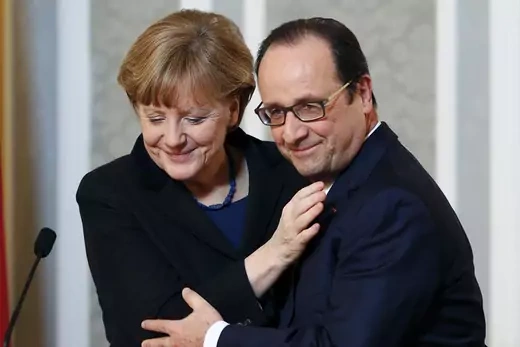
Putin and Poroshenko meet in Minsk to negotiate a cease-fire in eastern Ukraine. They reach an agreement, shepherded by French President François Hollande and German Chancellor Angela Merkel, that outlines thirteen steps to end the war, including an immediate cease-fire and the withdrawal of all heavy weaponry in order to create a “security zone.” Fighting and shelling along the line of contact still flare up from time to time. Both sides trade accusations on violations of the deal, though international observers place more blame on Russian and Russian proxy forces.
Lethal U.S. Arms Sales Allowed
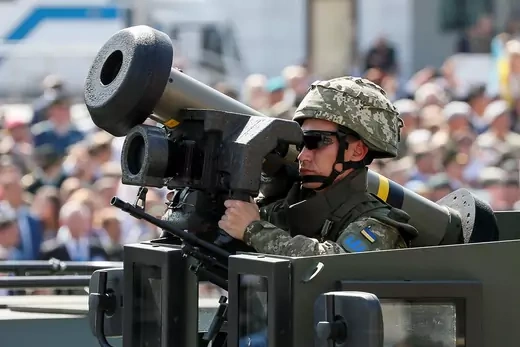
Under President Donald J. Trump, the United States approves lethal arms sales to Ukraine, moving beyond the nonlethal military assistance that the Obama administration had allowed. That summer, Trump had named Kurt Volker as his special envoy for Ukraine negotiations. Prior to that, the U.S. Congress created the Ukraine Security Assistance Initiative, which authorized hundreds of millions of dollars in additional military aid for Ukraine.
Schism Emerges in Orthodox Church
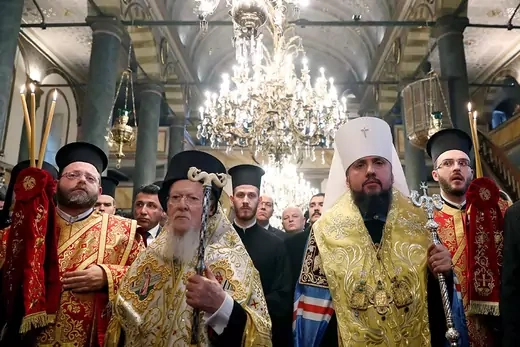
The Ecumenical Patriarch of Constantinople, the leading authority for Orthodox Christianity, recognizes the independence of the Ukrainian Orthodox Church, formally severing it from the Russian Orthodox Church, which has close reported ties to the Kremlin and had overseen the Ukrainian church for centuries. Russia accuses the United States of encouraging the break in order to weaken Moscow, and a Kremlin spokesperson reissues a promise to defend “the interests of Russians and Russian-speakers.”
Volodymyr Zelenskyy Elected
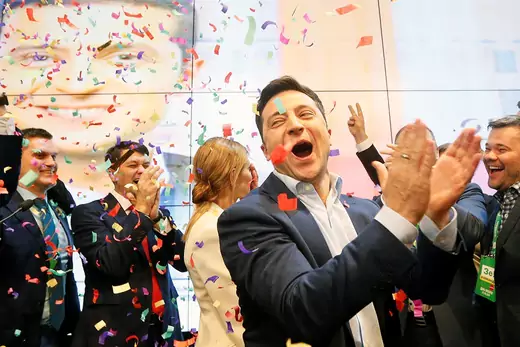
Volodymyr Zelenskyy, a television comedian and political novice, wins a presidential runoff with more than 70 percent of the vote, defeating Poroshenko. Two months later, Zelenskyy’s party also wins a majority of parliamentary seats, marking the first time since independence that Ukraine’s president has a majority party in the parliament. Zelenskyy had campaigned against corruption and poverty, and pledged to end the war in the east; many saw the vote as a rejection of Poroshenko and his failure to root out corruption.
A Phone Call Reverberates
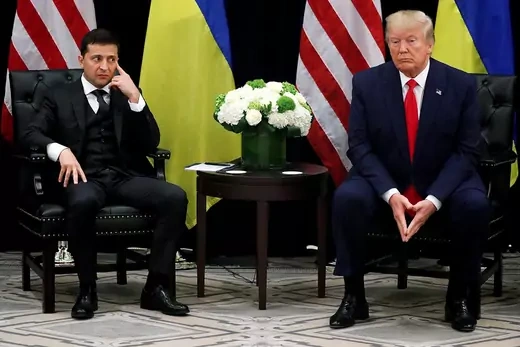
Trump and Zelenskyy have a phone conversation that later becomes the focus of an impeachment inquiry by the U.S. Congress into abuse of power and obstruction of justice. A U.S. government whistleblower expresses concern about Trump’s alleged effort during the call to enlist Zelenskyy to investigate Biden, a leading Democratic candidate in the 2020 presidential election. In November, several former and current U.S. officials testify before lawmakers that the Trump administration postponed a Trump-Zelenskyy meeting and held up congressionally approved military assistance to get Kyiv to investigate Biden. White House officials dismiss the complaints as politically motivated, and in January 2020, Trump is acquitted in a Senate vote mostly along party lines.
Making a Deeper Commitment to NATO
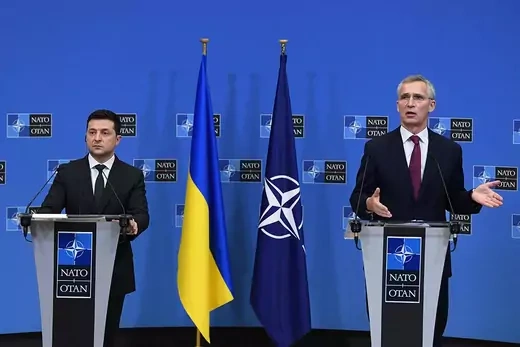
Ukraine is named a NATO Enhanced Opportunities Partner in June, joining Australia, Georgia, Finland, Jordan, and Sweden as countries with deeper cooperation on NATO-led missions and exercises. The alliance says the new status “does not prejudge any decisions on NATO membership.” In September, Zelenskyy approves Ukraine’s new National Security Strategy, which provides for the development of a distinctive partnership with NATO with the aim of gaining membership. The previous year, Zelenskyy’s predecessor signed a constitutional amendment committing Ukraine to become a member of NATO and the EU.
Zelenskyy Cracks Down on Pro-Moscow Oligarchs
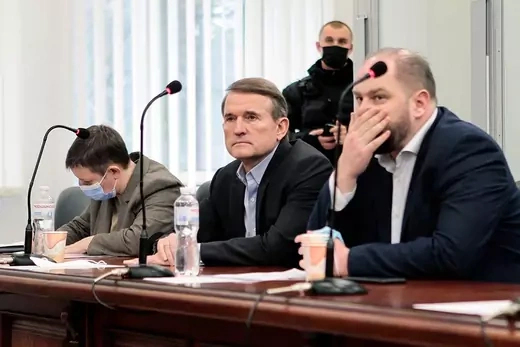
Zelenskyy orders a series of measures against oligarchs, notably Viktor Medvedchuk, a businessman, chairman of Ukraine’s largest pro-Russia political party, and close friend of Putin’s. The government freezes his financial assets for three years and shuts down three pro-Russia TV channels that Medvedchuk controls, alleging that they broadcast “misinformation.” That May, authorities lodge treason charges against Medvedchuk, claiming that he transferred oil and gas production licenses in Crimea to Russian authorities. Zelenskyy says the moves are necessary to defend the country, while Putin blasts them as motivated by anti-Russia bias.
Russian Military Buildup Raises Alarms
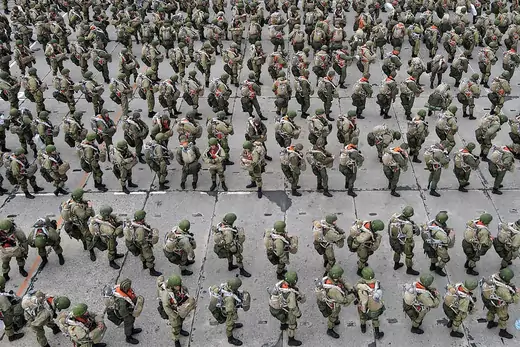
Officials from Ukraine and EU member states warn about recent Russian deployments near Ukrainian border areas and in Crimea. Adding up to more than a hundred thousand troops, along with tanks, rocket launchers and other weaponry, analysts call it the largest troop buildup since Russia’s 2014 annexation of Crimea. Biden, now U.S. president, and Putin agree to a June summit to discuss a range of contentious issues, including Ukraine, and launch dialogues on strategic stability and cybersecurity. The following month, Putin publishes an article titled “On the Historical Unity of Russians and Ukrainians,” in which he questions the legitimacy of Ukraine’s borders, asserts that Russians and Ukrainians are “one people,” and blames the collapse in bilateral ties on foreign plots and anti-Russia conspiracies.
Nord Stream 2 Pipeline Completed
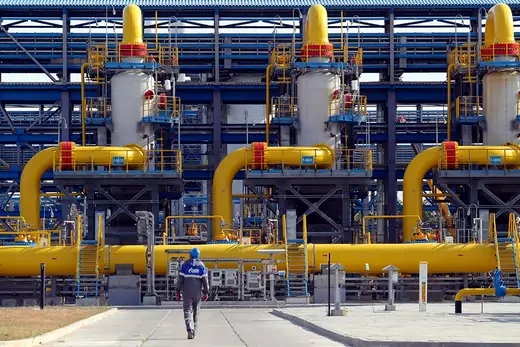
The Russian energy firm Gazprom finishes construction of the Nord Stream 2, a pipeline that is set to deliver natural gas under the Baltic Sea to Germany and could cut off a major source of income for Ukraine, a current transit country. Leaders in Kyiv protest that Moscow will use the pipeline, which could double gas deliveries to the rest of Europe, as a geopolitical weapon. The Biden administration opposes the pipeline but agrees to hold off on sanctions and reaches a deal with Germany to fund alternative energy projects for Ukraine. Amid the Russian military buildup near Ukraine, Germany says a German-based firm involved in the project must take administrative steps before any gas can flow, a process that could take until mid-2022.
Russia Demands Security Concessions
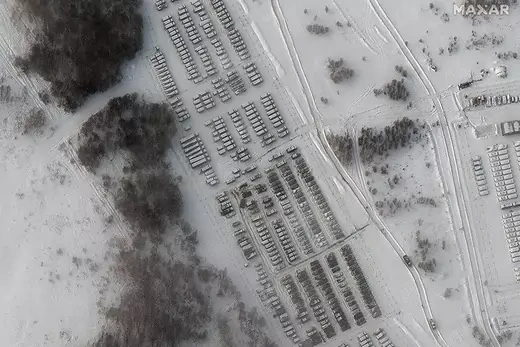
As Russia continues to mobilize tens of thousands of troops along the border with Ukraine, the Putin government demands a set of security guarantees from the United States and NATO. This includes a draft treaty calling for tight restrictions on U.S. and NATO political and military activities, notably a ban on NATO expansion. The Biden administration delivers written responses in January; few details are made public, but it rejects Russia’s insistence that Ukraine never be accepted into NATO and proposes new parameters for security in the region.
Russia Invades Ukraine
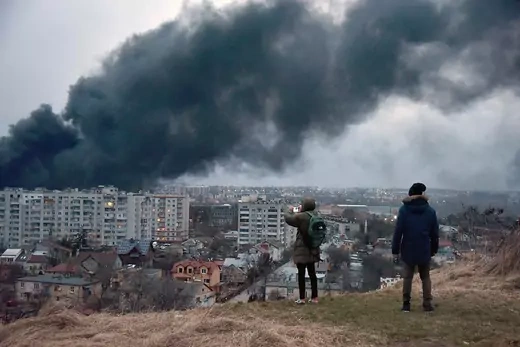
Russia launches a multi-pronged assault on Ukraine, including an invasion by Russian forces from neighboring Belarus. In a series of addresses to the nation, Putin reiterates his claim that Ukraine is part of Russia and calls the government in Kyiv a fascist “puppet regime” run by foreign powers. He frames his intervention as a mission to “demilitarize” and “de-Nazify” the country and protect its Russian-speaking population in the east from genocide. Putin warns outside countries not to intervene, threatening them with “consequences you have never faced in your history.” The invasion draws broad international condemnation, including from the United States, European Union, and the United Nations, and Washington and Brussels promise “severe” sanctions on Russia. However, Biden rules out any involvement of U.S. troops in Ukraine.
Ukraine Repels Russia From Kyiv in Surprise Early Victory
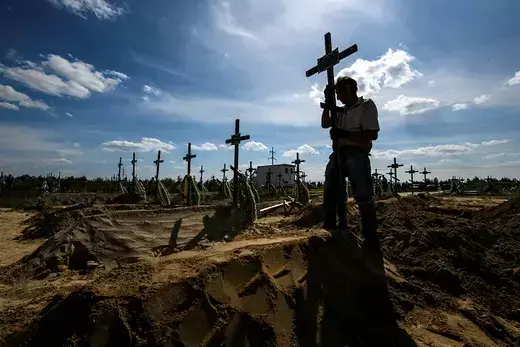
Ukrainian forces drive Russian troops out of several areas surrounding Kyiv, dispelling notions of a quick Russian military victory. Despite Russia’s military superiority, analysts say Ukraine’s early success is due to a combination of factors, including geographical knowledge, modern weaponry—most of which is supplied by the West—and the tactical use of smartphone devices. As Russia pulls back from the area, Ukrainian officials report potential Russian war crimes and crimes against humanity; their findings include mass graves in nearby districts such as Bucha, Irpin, and Hostomel. Zelenskyy accuses Russian forces of committing “genocide” and the International Criminal Court launches an investigation.
Fall Counteroffensive Deals Blow to Russian Military
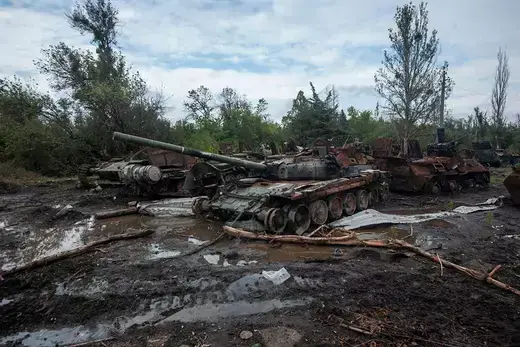
Ukraine launches a “lightning” counteroffensive to reclaim major cities in Russia-occupied territory in the northeast and south. Ukraine’s military liberates the southern regional city of Kherson, and in the north, troops push Russian forces back across the Dnipro River. They also recapture the region of Kharkiv, including the hubs of Balakliya, Izyum, and Kupyansk, in what is seen as a major strategic defeat for the Russian military. As Moscow faces mounting losses, Putin orders a partial mobilization of some three hundred thousand military reservists. He also announces Russia’s annexation of four Ukrainian regions, claiming the residents of Donetsk, Luhansk, Kherson, and Zaporizhzhia as “our citizens forever.” Following Putin’s announcement, Zelenskyy says Ukraine is submitting an accelerated application to join NATO.
Zelenskyy Addresses U.S. Congress, Appeals for More Wartime Aid
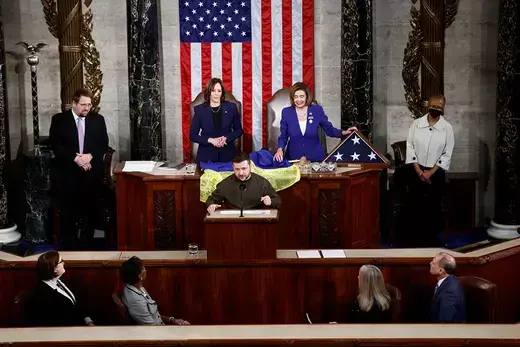
During a visit to Washington, Ukraine’s president urges U.S. lawmakers to continue providing aid and weapons to bolster Kyiv’s defenses through the winter. Since the outbreak of the war, Ukraine has become by far the largest recipient of U.S. foreign aid, the first time that a European country has held the top spot since World War II. Dozens of other countries, including most members of the EU and NATO, provide Ukraine with large aid packages [PDF] during the first year of the war. Many countries have also given Ukraine advanced weapons systems, including the United States. Zelenskyy’s Washington trip is his first out of the country since the war began and it comes as Congress debates a spending bill that includes an additional $45 billion in aid to Kyiv that is ultimately approved.
Russia Claims Control of Bakhmut After War’s Bloodiest Battle
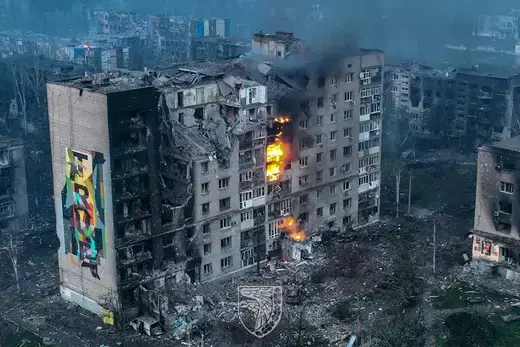
Russian forces declare control of the eastern city of Bakhmut after nearly a year of fighting in the longest and bloodiest battle of the war so far. It marks the first claimed Russian victory of a large Ukrainian city since summer 2022, though Ukraine says its forces continue to fight for control of Bakhmut. U.S. intelligence estimates that Russian casualties from the monthslong battle amount to some one hundred thousand, which includes ten thousand members of the Russian private military company Wagner Group.
Ukraine Begins Spring Offensive to Breach the Front Line
Ukraine’s military goals are to reach the Russia-occupied cities of Berdyansk and Melitopol, as well as disrupt Russian supply routes by cutting Moscow’s land connection to the Crimea. Expectations in Ukraine and the West are high following the previous year’s successful counteroffensive in the northeast and south, and Kyiv’s success in this campaign could lead to more financial and military aid. On the battlefield, Ukraine’s military is equipped with extensive artillery and ammunition, but it faces established Russian defensive infrastructure, including ditches, landmines, and trenches. The counteroffensive is slow, and Ukrainian troops make only incremental gains over the next several months.
Prigozhin’s Wagner Group Stages Mutiny, Challenging Russian Leadership
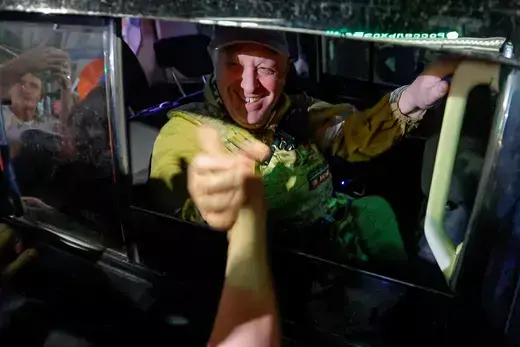
The Wagner Group and its leader Yevgeny Prigozhin stage an armed mutiny against Russian leadership, seizing military installations in the southern city of Rostov-on-Don before advancing toward Moscow. The Wagner Group has played a significant role in the war, and its troops were heavily involved in the battle for Bakhmut. While Prigozhin reaches an agreement with the Kremlin the following day, the short-lived rebellion sows momentary political chaos in Russia. Two months after the rebellion, Prigozhin and other senior Wagner leaders die in a plane crash that U.S. intelligence assessments conclude was caused by an intentional explosion. Ukrainian forces, meanwhile, have made only gradual progress so far in their attempt to retake Russian positions in the east and south.
Russia Withdraws From Grain Deal, Alarming Global Food Markets
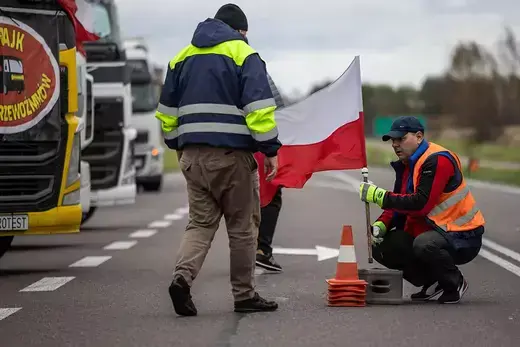
Moscow announces that it is pulling out of the Black Sea Grain Initiative, an agreement brokered by Turkey and the United Nations in July 2022 in which Russia agreed to ease its military blockade of Ukraine’s Black Sea ports to help facilitate exports of Ukrainian fertilizer, grain, and oilseed. Russia says its withdrawal is due to Western sanctions that are impeding exports of its own fertilizer and food. Russia’s exit from the deal generates alarm in many lower-income countries in Africa and the Middle East that are grappling with food insecurity and rely on Ukrainian grain. But Ukraine pivots and makes use of so-called “solidarity lanes”—alternative routes via rail, road, and rivers—that were created shortly after the war broke out and allow Kyiv to transit food through neighboring countries. However, in September, Hungary, Poland, and Slovakia impose import bans on Ukrainian grain after their own farmers express concern about selling their crops.
EU Opens Accession Talks With Ukraine
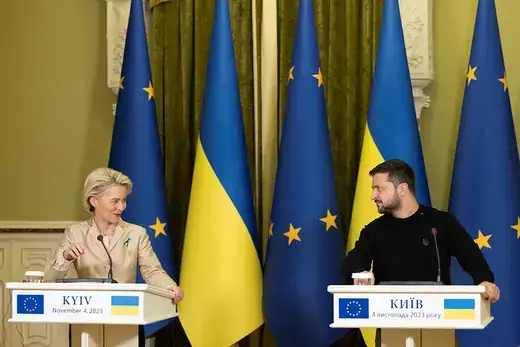
EU leaders agree to open accession negotiations with Ukraine, marking a step forward in the country’s pursuit of membership in the bloc, though the process is expected to take several years. Zelenskyy hails the decision as a “victory” for Ukraine and Europe. The move comes amid a grinding military stalemate in the war and as political support for Ukraine falters in some Western countries, including the United States.
Ukraine Loses Avdiivka as War Enters Third Year
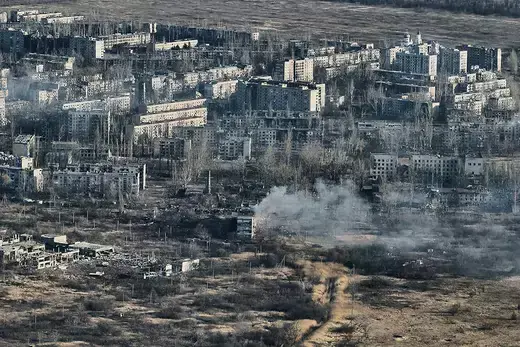
Eight months after launching its spring counteroffensive, Ukraine’s military has made little progress in retaking Russia-controlled territory in the east. Russian troops have fortified their defensive line, and Ukraine is eventually forced to withdraw from the city of Avdiivka in Donetsk province after months of fierce fighting. Hundreds of Ukrainian troops are feared to be captured or missing after the pullback. The move gives Russia its biggest military victory since the fall of Bakhmut in May 2023, and is seen as bolstering Russia’s hold on Donetsk. Ukraine’s foreign minister says the loss of Avdiivka is due to the United States’ failure to approve additional emergency wartime aid as Kyiv’s supplies run low. Russia’s seizure of Avdiivka follows a reshuffling of Ukraine’s military leadership and comes just ahead of the second anniversary of Russia’s full-scale invasion.
Ukraine Launches Incursion Into Russia’s Kursk Region

Ukrainian forces mount a surprise offensive into the Kursk region in western Russia, seen as a bold attempt to divert advancing Russian forces in the Donbas. In response, Russia launches a “counterterror operation” in Kursk, as well as in two other nearby regions that have been hit hard by aerial attacks and shelling. According to Ukrainian and Western assessments, thousands of North Korean soldiers have been deployed to Kursk as part of Russia’s offensive, sparking concerns about escalation of the war. The North Koreans’ involvement spurs Biden in November to authorize Ukraine’s first use of the U.S.-made Army Tactical Missile Systems (ATACMS)—with a range of roughly 190 miles—to hit targets deep within Russian territory. More than six months after Ukraine’s initial offensive, Russian forces have regained control of up to half of the territory that Ukraine initially captured.
U.S., Russia Advance Peace Talks

Amid a flurry of diplomacy in Europe, senior U.S. and Russian officials meet in Riyadh, Saudi Arabia, to discuss the war in Ukraine. The high-level talks between U.S. Secretary of State Marco Rubio and Russian Foreign Minister Sergey Lavrov are the first since Russia launched its full-scale invasion three years prior. No Ukrainian or other European representatives attend. Days before the U.S.-Russia talks, at the Munich Security Conference, Zelenskyy warns against any agreement without Ukrainian involvement, prompting critical statements from Trump, who escalates to charges that the Ukrainian president is a “dictator” and that elections are needed in Ukraine. Zelenskyy also calls for the creation of a European army in response to Russia’s military build-up on the continent.
 Online Store
Online Store